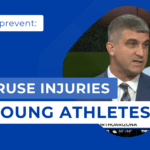What is a Labral Tear (of the Shoulder)?
 The labrum is a piece of fibrocartilage (rubbery tissue) attached to the rim of the shoulder socket that helps keep the ball of the joint in place. A “Labral Tear” occurs when this cartilage is torn. Labral tears often result from injury, or sometimes as part of the aging process.
The labrum is a piece of fibrocartilage (rubbery tissue) attached to the rim of the shoulder socket that helps keep the ball of the joint in place. A “Labral Tear” occurs when this cartilage is torn. Labral tears often result from injury, or sometimes as part of the aging process.
Two Common Types of Labral Tears
SLAP (Superior Labrum from Anterior to Posterior) Tears: SLAP tears occur where the bicep tendon connects to the shoulder at the front of the upper arm.
Bankart Tears: Bankart tears, on the other hand, typically occur with shoulder dislocation in younger patients and can lead to either anterior or posterior instability of the humerus.
Labral Tear Symptoms
Labral tears can be quite painful and are often described as feeling like the shoulder joint is catching, locking, popping, or grinding.
Other symptoms of labral tears and shoulder instability may include:
- Pain in the shoulder joint
- Unstable feeling during shoulder movement
- Locking and catching sensation in the shoulder joint
- Limited overhead activities
- Loss of shoulder strength and range of motion
- Loss of velocity when throwing
While this condition commonly occurs as a result of other shoulder injuries, like dislocations, rotator cuff injuries, and torn bicep tendons, some specific causes of sports-related labral tears include:
- A fall on an outstretched arm
- A direct hit to the shoulder
- A violent blow while reaching overhead
- A sudden tug on the arm
Some labral tears, however, are the result of a wearing down of the labrum that occurs naturally over time. In older patients, fraying or tearing of the labrum can be seen as a normal process of aging. This differs from acute injuries in athletes and younger individuals.
The best way to diagnose a labral tear is by seeking an evaluation from an Orthopedic Physician. They will perform a clinical exam to evaluate for a tear. In order to do an evaluation, the Physician will perform several common orthopedic special tests that indicate a labral tear could be present and may order an MRI to definitively diagnose the tear and also help determine the severity.
Labral Tear Treatment Options
Depending on the severity of the tear, some may benefit from conservative or non-surgical treatment. A combination of relative rest, anti-inflammatory medicines and physical therapy can be the first choices for the treatment of a labral tear.
If the tear is severe enough or if the conservative methods are insufficient, your orthopedic specialist may recommend surgery. Doctors often repair labral tears with arthroscopy. This minimally invasive procedure involves making a small incision in your shoulder to allow a small camera to capture images of the joint.
Labral tears of the shoulder are often painful and can cause decreased motion in the joint. Understanding what a labral tear is and your treatment options can help you resume a pain-free lifestyle faster. OrthoArizona has nearly two dozen offices throughout the Valley, each focused on quality care, compassion, and excellent customer service. Since 1994, OrthoArizona has been dedicated to compassionate care of the highest quality.
Make an appointment today to start your healing journey.
The advice and information contained in this article is for educational purposes only and are not intended to replace or counter a physician’s advice or judgment. Please always consult your physician before taking any advice learned here or in any other educational medical material.











